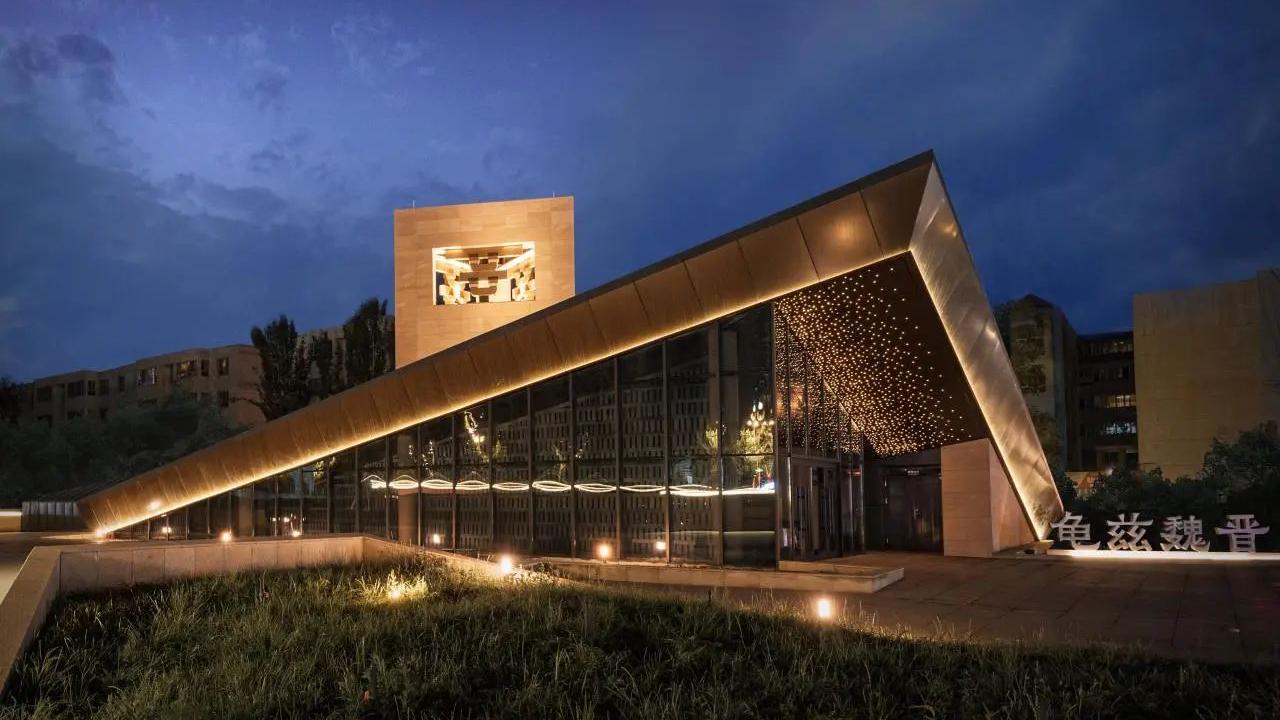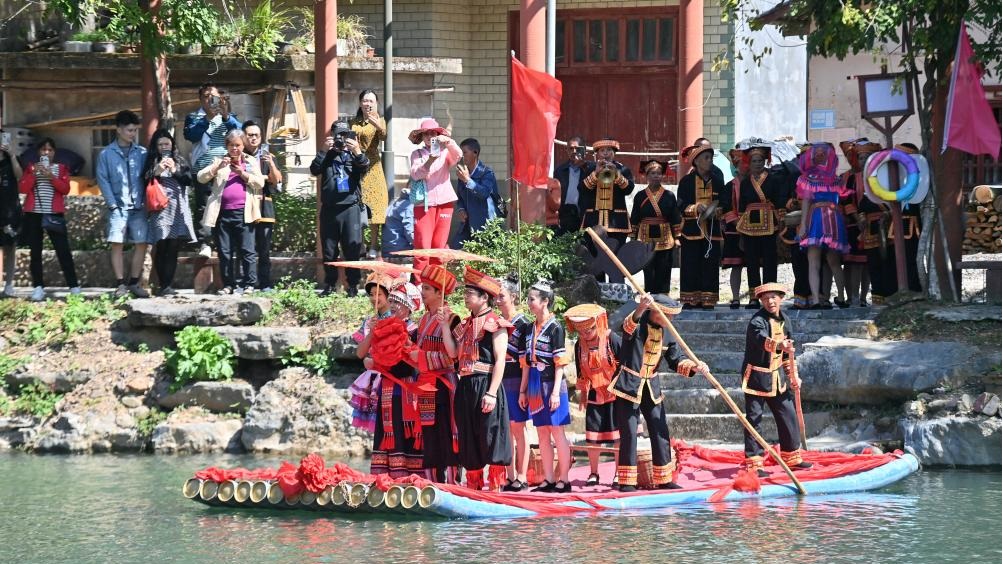Gen Z's love of traditional Chinese costumes shows their cultural confidence
In recent years, wearing traditional Chinese attire has become a fashionable trend among an increasing number of young people, particularly those born between 1995 and 2009, known as Gen Z.
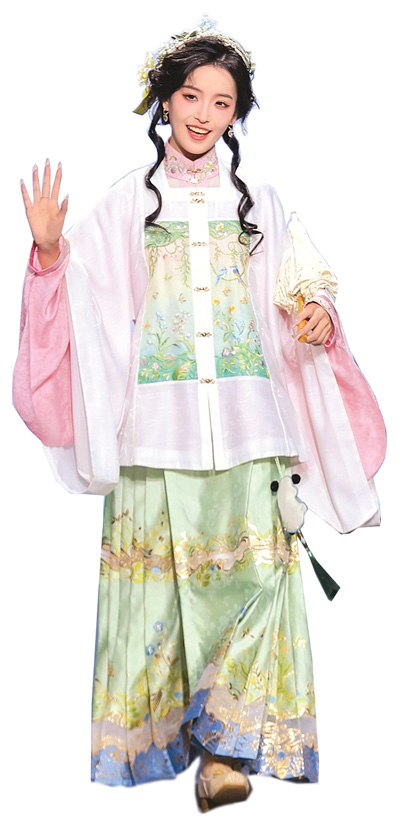
A model in traditional Chinese costume walks the runway during the 2024 Chinese Costume Festival held at the China National Silk Museum in Hangzhou, east China's Zhejiang Province, in April 2024. (Photo courtesy of the China National Silk Museum)
Traditional Chinese costumes are now being worn by them for everyday activities from shopping to commuting, no longer confined to photo ops or special occasions. This shift has boosted sales of traditional garments and fueled the popularity of activities themed on clothing culture, including the Chinese National Costume Day, Hanfu festivals, and exhibitions featuring traditional costumes, injecting new vitality into the Chinese clothing culture with thousands of years of history.
According to Han Dan, an associate professor at the Fine Arts Academy of Northeast Normal University, traditional Chinese costumes are collectively known as Hanfu.
China's Gen Z, who puts a fresh spin on traditional culture, has played a pivotal role in this Hanfu revival, showcasing their confidence, fashion, and openness.
Born after 1995, Zhang Jing, a Hanfu enthusiast from Shijiazhuang city in north China's Hebei Province, recently became a "princess of the Tang Dynasty (618-907)" at a Hanfu shop in Xi'an, northwest China's Shaanxi Province.
For Zhang, Hanfu represents both historical and cultural significance and fashion-forward thinking. She bought a Mamianqun, literally translated as "horse-face skirt", a type of Hanfu that features a high and flat front and pleated sides. "The traditional dress is simple, elegant, and I can even wear it to work without feeling out of place," she said.
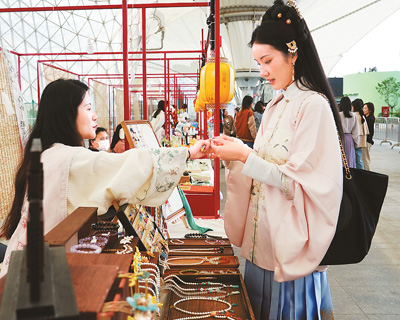
A Hanfu enthusiast selects products at a market during the 2024 Chinese National Costume Week in Shanghai. (Xinhua/Liu Ying)
After Zhang watched a classical dance show on the Tang Dynasty in 2021, she had been planning to travel to Xi'an to experience the traditional clothing of the dynasty.
As Zhang strolled through the streets of the Datang Everbright City, a tourist landmark featuring a grand street with characteristics of Tang Dynasty in Xi'an, she found herself among many others dressed in traditional costumes and stepping back in time to the dynasty, with ancient architecture providing the perfect backdrop for gorgeous traditional clothing.
The rise of the "Hanfu craze" is rooted in material and cultural-ethical advancement brought by China's rapid economic development, and government efforts to promote traditional culture, said Han.
"Gen Z, who grew up during China's tremendous transformation from growing prosperous to becoming strong, harbors a deep love for traditional culture," Han added.
China's profound traditional clothing culture satisfies young people's desire for traditional culture and new aesthetic experiences and fashions, said Cui Wei, a professor at Beijing Institute of Fashion Technology.
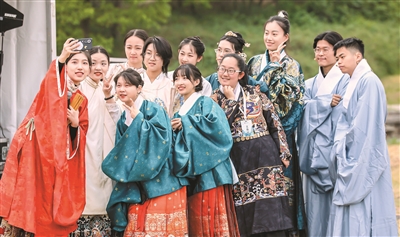
People in traditional Chinese costumes pose for photos at Beijing's Yuanmingyuan Ruins Park during the 5th Chinese National Costume Day. (Photo courtesy of the management office of Yuanmingyuan)
"Traditional Chinese clothing embodies profound cultural significance, aesthetic principles, and national characteristics. Those who wear traditional costumes show their cultural confidence while highlighting cultural heritage and strong Chinese characteristics," Cui added.
The popularity of traditional Chinese costumes has sparked creativity and personalization among Gen Z. Some young traditional attire enthusiasts design their own outfits, expressing their interpretations of clothing culture, traditional culture and contemporary fashion, Han said, adding that this is in line with Gen Z's diverse interests and personalized self-expression.
In addition, the "Hanfu craze" has fostered a broader interest in traditional Chinese culture among young people. The Huazhang Hanfu Club, initiated in 2011 at Beijing Normal University, has attracted 94 members.
The Hanfu club often collaborates with other clubs in the university to hold activities themed on traditional culture, including Hanfu exhibitions, popularization of relevant knowledge, performances of guqin, a traditional Chinese musical instrument, tea ceremonies, and poem recital activities, creating immersive cultural experiences that attract both domestic and international students.
"Wearing traditional attire often goes hand in hand with learning about ancient etiquette and cultural custom, allowing young people to delve deeper into the rich connotation of traditional Chinese culture," Han said.
Photos
Related Stories
Copyright © 2024 People's Daily Online. All Rights Reserved.







